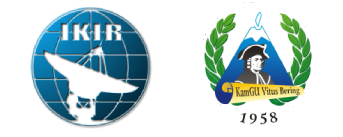JOURNAL EDITORIAL
General provisions
The current activities of the Editorial Board are managed by the Editor-in-Chief of the Journal.
Editor-in-Chief:
- represents the interests of the Editorial Office in relations with the Co-founders, distributors, citizens, their associations and organizations;
- organizes the work of the Editorial Board, gives binding instructions to all those involved in the issue of the Journal;
- forms a publishing group dealing with the issue of the Journal, and manages it;
- carries out the selection of authors, reviewers for work in the Journal;
- monitors compliance with the ethical principles of scientific publications;
- signs agreements on the transfer of copyright and other documents necessary for the functioning of the Journal;
- signs for printing each issue of the Journal;
- resolves other issues referred to its competence by this Charter and the Regulations on the work of the editorial board of the Journal, as well as the Charters or other documents of the Co-Founders and the Editorial Board.
The Journal Editorial have the right to independently:
- determine the policy, language, subject and specialization, periodicity and volume of the Journal, territory and form of periodic distribution of the Journal;
- plan their activities within the framework of the topics approved by the Co-Founders, specialization and focus of the Journal; resolve issues of content, technical and artistic design;
- attract creative and technical workers to perform individual tasks;
- in accordance with the established procedure, carry out correspondence with the readers of the Journal, take into account their interests and suggestions;
The Journal Editorial is obliged:
- ensure a high content, scientific and professional level of publications;
- ensure that the ethical principles of scientific publications are observed by all participants in the publication process;
- carry out registration of materials for printing in accordance with the requirements of standards, specifications, other regulatory documents and contracts with a printing company and other organizations;
ensure adherence to approved production schedules; - publish materials of the Co-founders in agreement with the editor-in-chief.
- The editorial board consists of the Editorial Board and the Editorial Council.
Editorial Board.
- The editorial board consists of people directly involved in the work on the Journal. Members of the Editorial Board of the Journal take part in the development and preparation of editorial plans, participate in the events of the Editorial Board, make proposals to the management to improve the quality of the Journal and speed up the editorial and publishing process. The editor-in-chief is a member of the editorial board of the Journal.
- The Editorial Board is convened by the Editor-in-Chief and is held (in face-to-face meetings, or via Zoom, Skype and other teleconferences) at the time set by him and as necessary to discuss issues related to the production and release of the Journal. The Editor-in-Chief presides over the meetings of the Editorial Board of the Journal, and in his absence, the Deputy Editor-in-Chief.
- The agenda of the meetings of the editorial board is determined by the Editor-in-Chief of the Journal. Members of the editorial board have the right to demand that additional issues be included in the agenda. This requirement can be made both before the start of the meetings and at the meetings of the editorial board.
The meeting of the editorial board of the Journal is competent if at least two thirds of the members of the editorial board, including the editor-in-chief, take part in it. Decisions are taken by a simple majority vote of the members present and approved by the editor-in-chief. - Minutes are kept at each meeting of the Editorial Board of the Journal. All decisions of the collective meeting are recorded in the minutes. The minutes are signed by the chairman and the secretary.
Members of the editorial board and the editorial board can submit their work for publication in the journal, subject to the requirements of the “Conflict of Interest Regulations”. - Decisions on issues related to unethical actions are taken jointly by the editor-in-chief of the Journal, representatives of the Co-founders, as well as the editor (curator) of the corresponding section of the Journal, if such was appointed by the Editor-in-Chief.
Editorial Council.
- The Editorial Board of the Journal is a public advisory body.
- Highly qualified specialists and scientists of the relevant field of activity are invited to the editorial board.
- The Chairman of the Editorial Board reports to the Editor-in-Chief of the Journal.
- The Editorial Board meets as needed at the initiative of the Editor-in-Chief of the Journal and can be held using electronic means of telecommunications (via teleconferences Zoom, Skype, etc.).
- The decisions of the editorial board are advisory in nature.

